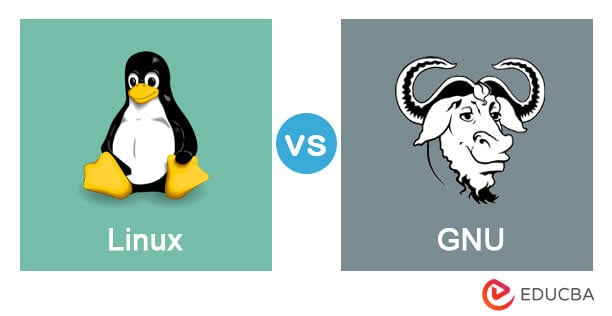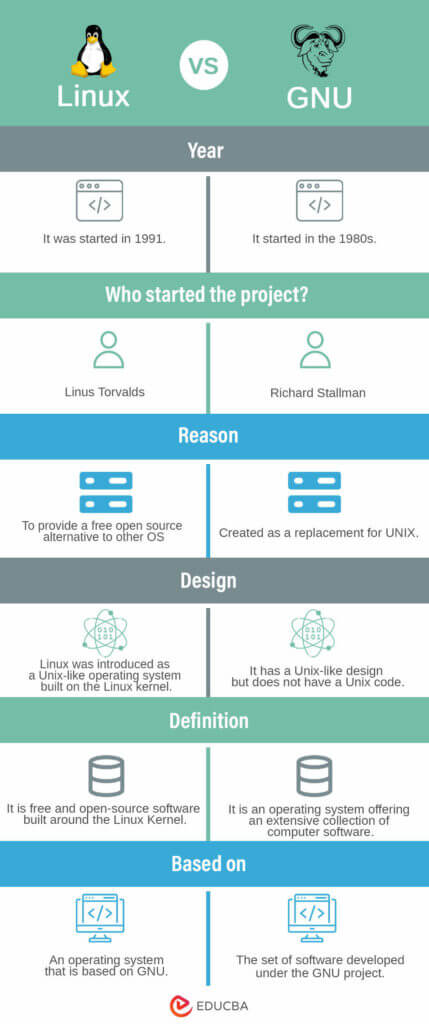Updated February 14, 2023

Introduction to Linux vs GNU
Linux and GNU are both operating systems based on different projects. The development of GNU was to replace UNIX, and Linux is a combination of GNU and Linux Kernel. While GNU is a bundle of various softwares, Linux is open-source software built around the Linux kernel.
An operating system is an interface between the hardware and the active user while ensuring the proper functioning of the entire system. Linux comes from the development chain of Unix, while GNU is a replacement for the UNIX project. The significant difference was their software dependencies.
Key Highlights
- GNU is a free and independent operating system designed by Richard Stallman as a replacement for UNIX, which has nothing to do with codebase or licensing norms such as Unix or Linux.
- GNU is a cheaper version of Unix with many free softwares.
- While Linux, on the other hand, is an operating system that comprises GNU software and the Linux kernel.
What is Linux?
- Linux is an operating system that manages the system’s hardware and software. It sits between the applications and hardware.
- It is similar to UNIX but can run on various hardware, from phones to supercomputers.
- Every Linux-based OS consists of a Linux kernel that handles hardware resources and software packages comprising the operating system.
- In 1991, Linus Torvalds introduced Linux to improve Unix but needed help convincing Unix developers. Thus launched, Linux as a separate OS under the GNU license. It comprises GNU software and Linux kernel.
- A community of developers integrates GNU components with Torvalds’ kernel to build a complete, free OS, Linux.
- Torvalds started to develop the Linux kernel, and the community continues to create and integrate other essential components.
- Later, several distributions of Linux were launched and gained popularity across the globe. Below is the chart showing active Linux distributions.
What is GNU?
- The GNU project started the GNU, a Unix-compatible, Unix-replacement operating system.
- In 1983, Richard Stallman started this project to create non-proprietary software. It allows users to download, alter, and re-distribute the GNU softwares.
- It has a design similar to Unix but has no Unix code and is available for free use.
- It comprises many software applications, libraries, and developer tools, including a powerful program that allocates resources and interacts with the underlying hardware or kernel.
- You can easily use GNU with other kernels.
- The primary components of a GNU system are as follows, GNU compiler collection, GNU C library, GNU Emacs text editor, and GNOME desktop environment.
- You can use any port for any GNU programs to various operating systems, such as Mac OS X and Microsoft Windows.
The key difference between Linux vs GNU
- GNU is an operating system with different types of computer softwares, while Linux is a free and open-source software built around the Linux Kernel. It is one of the core differences between them.
- All the softwares of GNU is under the GNU project, while Linux is an GNU-based OS.
- Its invention was to replace high-cost Unix. Linux is a Unix-based OS that is built on the Linux kernel.
- Linux is the kernel for the OS, while GNU/Linux is an open-source software operating system for computers composed of free software and tools.
Head-to-head comparison of Linux vs GNU
| GNU | Linux | |
| Year | It started in the 1980s. | It started in 1991. |
| Who started the project? | Richard Stallman | Linus Torvalds |
| Reason | Created as a replacement for UNIX. | To provide a free open source alternative to other OS |
| Design | It has a Unix-like design but does not have a Unix code. | Linux was introduced as a Unix-like operating system built on the Linux kernel. |
| Definition | It is an operating system offering an extensive collection of computer
software. |
It is free and open-source software built around the
Linux Kernel. |
| Based on | The set of software developed
under the GNU project. |
An operating system
that is based on GNU. |
Linux vs GNU Infographic
Here is an infographic explaining all the differences between linux vs GNU.
Final Thoughts
The primary difference between GNU and Linux is narrower. GNU is an operating system created as a replacement for UNIX due to its high usage cost. It provides several other softwares that you can use with other OS. Linux is an operating system that comprises GNU software and Linux kernel.
Frequently Asked Questions (FAQs)
Q1. What are the benefits of Linux?
Answer: The Linux project’s source code is freely accessible under the GPL license. Anybody can download the source code, modify it, create their version of Linux, and release it. Unlike Windows, you can use Linux without malware and virus protection. It is secure, but it does not mean that it is invulnerable to hacking attempts. While working with Linux, you do not have to worry about crashes as it is less prone to cracks than other operating systems. Due to its high stability, large enterprises are using Linux as their operating system.
Q2. Why should one use GNU?
Answer: Millions of people are using GNU/Linux and leveraging its several benefits. It comes with easy maintenance, including scanning for viruses, defragmenting, cleaning the registry database, rebooting, etc. It allows users to access the source code, modify it, and share it. It generally supports open standards, making integrating them with other platforms easier to avoid vendor lock-in.
Q3. Why do we use Linux?
Answer: When compared to other kinds of operating systems, Linux is more reliable, stable, and less prone to getting crashed with malware.
Q4. Which operating system does NASA use?
Answer: The majority of the systems at NASA, right from ground control to the OSS systems, make use of one of the oldest operating systems, Linux.
Recommended Articles
In this article, you learned about the differences between Linux vs GNU. You can refer to these articles to have more grip on the topics.



